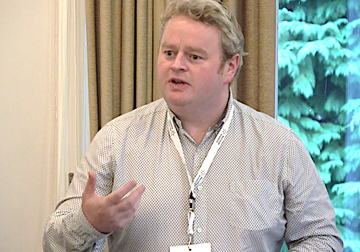Dr Richard Genever: Delivering optimal care through mutual trust
NewsDr Richard Genever
Consultant physician and movement disorders lead, Chesterfield Royal Hospital NHS Foundation Trust
Whilst training, Dr Richard Genever had not really considered Parkinson’s as a specialism until he was invited to do so by a senior colleague. When he first began to explore the condition, he felt he would never master it, it was so complex and individual to each patient. ‘What made it daunting in the beginning is actually what keeps it interesting in the long term,’ he notes. Now the movement disorders lead in his patch, the challenge that something can always be done better is a key motivation for his practice.
Richard sees patients in a number of different clinics. Whether diagnostic, giving multidisciplinary input or otherwise, he is clear that they all have a core aim regardless of what might be most apparent to him as a physician. ‘People need to have the things that matter most addressed,’ he says simply. Whatever symptoms might need addressing, at the centre of care for Richard is that the individual feels they were listened to, and that they leave the clinic with a very clear idea of what comes next in their care and how they can access it.
Building relationships is very important to Richard, not only because Parkinson’s is a life-long condition and he will inevitably manage the same patients for a long duration, but also because there is a clear correlation between mutual trust in a patient-physician relationship and the health and quality of life outcomes experienced.

‘We know that interactions between a patient and doctor almost never work unless they’re based on trust,’ he says. ‘There are various models of course, but we can see that an expectation of follow up, where that follow up is trusted to take place, can help to build better doctor-patient relationships.’
Richard highlights the importance of building this relationship on clear and honest information. ‘The way you discuss a treatment will affect how they get on with it but at the same time they need to understand both the pros and cons,’ he says. Giving the right amount of information in general can be a challenging area to get right, and Richard highlights the need to give enough information that the person feels supported, but not so much that they become overloaded.
‘You are always walking the line between not enough and too much information, and it will be a different amount for each individual.’
Positive relationships inevitably make a big difference to patients when they are being treated for something other than their Parkinson’s too. Richard has developed a system within his hospital where patients preparing for an operation are flagged in the hospital’s pre-assessment clinic so that he can develop a plan to support their Parkinson’s during their hospital stay. This might be around their medication such as if they become nil by mouth, to support their rehabilitation or even to change the course of their treatment slightly as was the case for a lady undergoing a complex spinal procedure. ‘She needed very tailored support; we actually under-treated her in the early post-operative stages to make sure that her spine was not harmed by involuntary movements, before putting her back on her usual treatment,’ he explains. ‘I knew her already; it helps that I nearly always know the person I’m reviewing’, he adds.

Richard clearly prioritises his patient’s experience of care, knowing it will impact their overall wellness and health outcomes. ‘We’re always learning, always adapting’ he says of himself, the team he works alongside, and the services they deliver. ‘There are some great tools to support good care, like the Parkinson’s audit, but there’s a danger it can turn an appointment into a tick box exercise. I want to deliver really good care on a personal level and still gather the information needed to make a good assessment.’
It is evident from Richard’s passion for his patients that he will always work hard to put their experiences and needs at the centre of his practice, and this is supported by his Faculty role in facilitating the ‘patient experience’ element of the Parkinson’s MasterClass, as well as teaching on optimal in-patient care. This involvement in the Parkinson’s community is another area of his work that he enjoys.
‘To feel part of a group with common goals, part of the change; that’s really wonderful.’
Useful links
- Follow Richard on Twitter @DrGenever
- Listen to Richard discuss a multidisciplinary approach to managing Parkinson’s
- Listen to Richard speak on Parkinson’s as a condition
- Review some of the research on patient-physician trust
- ‘Patients' Trust in Physicians: Many Theories, Few Measures, and Little Data’
- ‘Patient-physician trust: an exploratory study’
- ‘Professionalism: The importance of trust’
Related articles
'The things you can't get from the books'
Parkinson's Academy, our original and longest running Academy, houses 23 years of inspirational projects, resources, and evidence for improving outcomes for people with Parkinson's. The Academy has a truly collegiate feel and prides itself on delivering 'the things you can't get from books' - a practical learning model which inspires all Neurology Academy courses.



